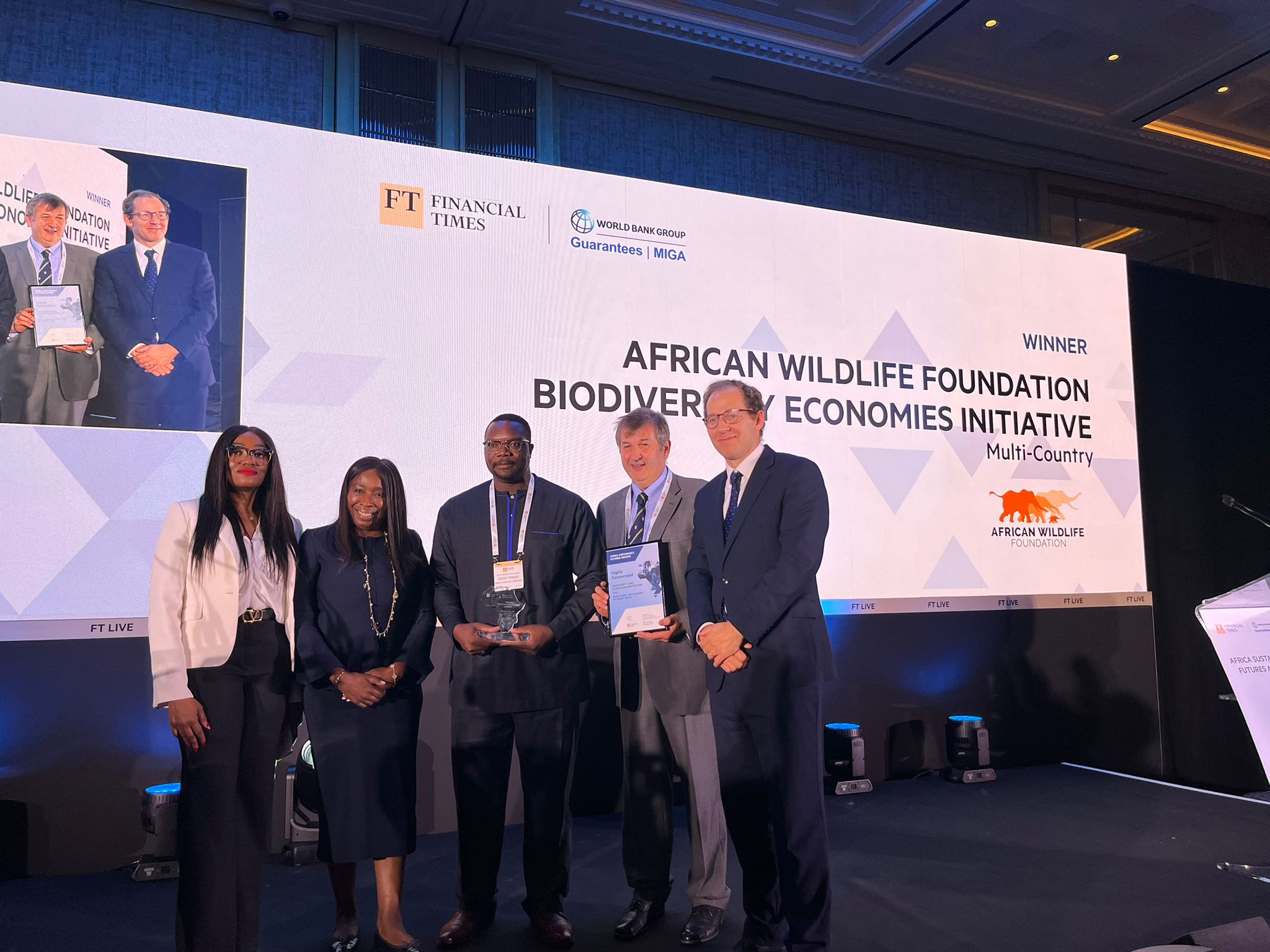AWF Wins Prestigious Africa Sustainable Futures Award

AWF's Director Global Leadership Edwin Tambara (center) receives the 2024 FT Africa Sustainable Future Award in London.
General Inquiries
Tel:+254 711 063 000
Ngong Road, Karen, P.O. Box 310
00502 Nairobi, Kenya
African Wildlife Foundation Wins Prestigious Africa Sustainable Futures Award from the Financial Times and the World Bank Group’s Multilateral Investment Guarantee Agency (MIGA)
AWF takes top spot in the Biodiversity and Ecosystems Protection category for its innovative work on Biodiversity Economies
November 1, 2024, Nairobi: The African Wildlife Foundation (AWF) has been selected as a winner in the Financial Times and the World Bank Group’s Multilateral Investment Guarantee Agency (MIGA) inaugural Africa Sustainable Futures awards programme to promote ground-breaking, long-term solutions to development challenges in Africa.
Taking place in London on Wednesday 30th October, following the Financial Times’ Africa Summit, the Africa Sustainable Futures Awards recognises regenerative projects in Africa that protect ecosystems by conserving or restoring natural capital and leverage biodiversity to create long-term growth, greener and higher quality jobs, more secure supply of food and water, and barriers to natural and man-made disasters.
AWF was selected as the winner of the Biodiversity and Ecosystems Protection category for its work in supporting Biodiversity Economies.
Biodiversity economies are a market innovation that puts the value of nature at the heart of economic decision making from national planning to household levels. AWF's inclusive approach to defining and facilitating biodiversity economies provides compelling evidence for investing in nature as a productive asset. This allows governments to effectively shape enabling policies, and creates frameworks to foster growth, investment, and sustainable development. These efforts are unlocking the full economic potential of biodiversity, driving conservation efforts, and enhancing livelihoods across the continent.
Judges recognised AWF’s partnerships with governments to ensure wildlife and economic development work in tandem, putting biodiversity is at the heart of decision making.
Accepting the award on behalf of AWF, Edwin Tambara, AWF Director of Global Leadership remarked: “At AWF, we are convinced that nature is an asset for [Africa], that it can drive our economic development. By working with governments to make sure that biodiversity can be seen as an economic pillar, we can create opportunities for Africans, particularly for African youth, who we see as a powerful driver for growth.”
Edwin continued: “This award gives us the motivation to work harder, and we hope to leverage this recognition to go to convince more African countries that we need to build their biodiversity economies as a critical component. This model can contribute to our economic growth in so many ways that we are yet to discover.”
Biodiversity economies are helping reposition natural resources as an asset that governments, communities and private sector can invest, grow and receive a return on investment. At the macro-level, countries such as Kenya, Zimbabwe, South Africa, Namibia, and Botswana have seen on average 8 –12 % percent contribution to GDP, evidence that biodiversity economies are viable and can generate revenues to sustain conservation, livelihoods, and profits.
AWF contributed to Zimbabwe’s development and launch of the Zimbabwe Biodiversity Economy Report in 2022, revealing that nature-based tourism annually contributes $1 billion to the economy, with over $500 million from non-timber forest products, $20 million from trophy hunting, and $12 million from wild fisheries. Other key subsectors include forestry and bioprospecting. Insights from this report are already informing policy reviews and improvements, such as the Wildlife Act and Forestry Policy, the biodiversity economy investment blueprint, natural capital accounts, and a carbon credits framework.
Commenting on future aspirations for the project, Kaddu Sebunya, CEO of AWF said: As the continent's development agenda shapes up, we expect biodiversity economies to become a key economic pillar for African nations, driving job creation, income, and revenue generation. These economies will particularly benefit conservation landscapes, which are often marginalized in economic agendas, by providing opportunities for local communities and vulnerable groups, such as women and youth. Through models like this, we can drive economic transportation and foster a more resilient and prosperous future where Africa's wildlife and people thrive in a modern Africa.”
About AWF
The African Wildlife Foundation (AWF) is Africa’s oldest global non-governmental organization dedicated to ensuring that wildlife and wildlands thrive in modern Africa. AWF’s programs focus on integrating wildlife conservation, human development, and economic growth, ensuring a sustainable future for both people and wildlife.
For more information on AWF’s work in biodiversity economies, please contact: media@awf.org
For information about the Awards: https://www.miga.org/press-release/africa-sustainable-futures-awards-winners-announced